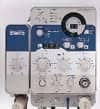A study conducted by researchers at Boston University School of Medicine has found that diesel exhaust particulates (DEP) and house dust extract (HDE) causes pulmonary inflammation that aggravates asthma. The study appears in the American Journal of Pathology.
The researchers found that exposure to both HDE and DEP demonstrated increased mucus production and higher airway resistance compared to exposure to only HDE. Pulmonary inflammation was measured by oxidative stress, respiratory physiological features, inflammatory cell recruitment, and local CXC chemokine production, or soluble mediators or inflammation.
The researchers point out that while cleaning can help remove some of the HDE allergen exposure, DEPs are especially hard to avoid in urban environments. Additionally, the researchers note that the findings show a direct link between air pollution and exacerbation of pre-existing pulmonary diseases, like asthma, meaning there could be a tangible therapeutic target and that anti-oxidative treatment could be beneficial to asthmatic patients, especially those with increased air pollutant exposure.
Source: Boston University Medical Center









